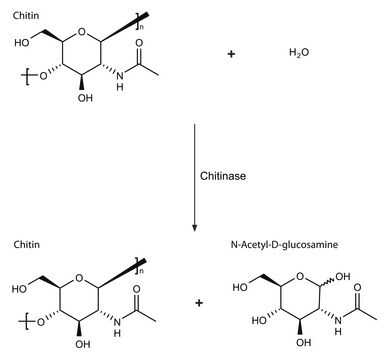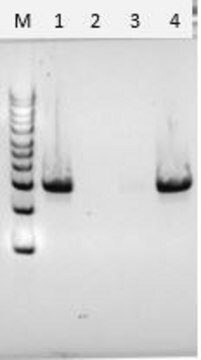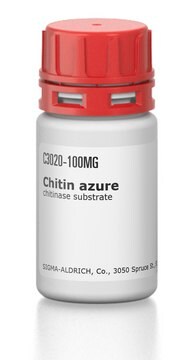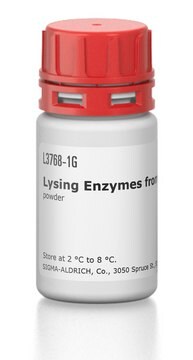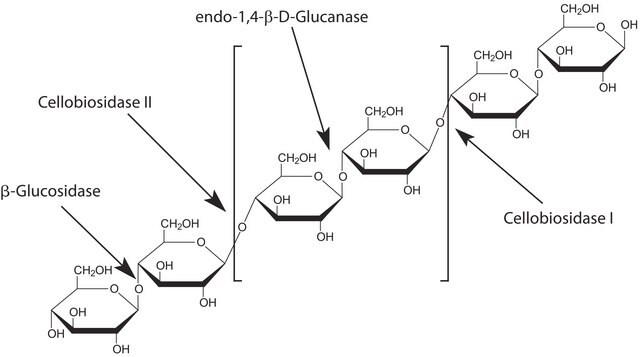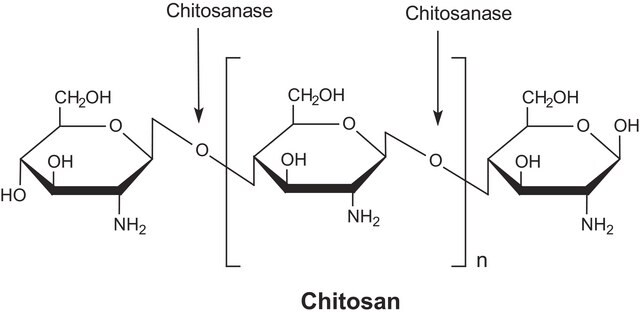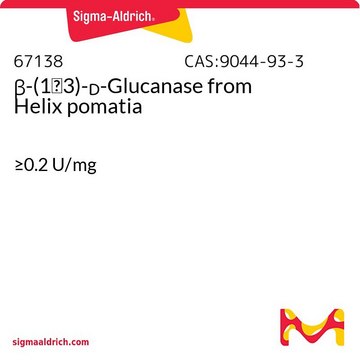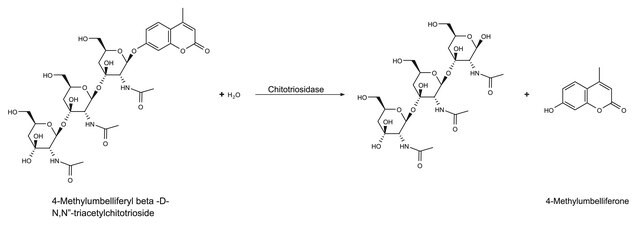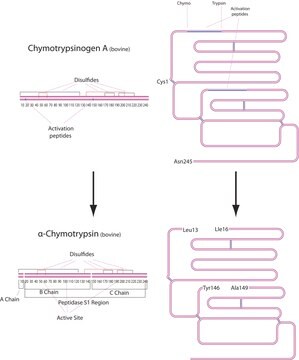추천 제품
일반 설명
Chitinase is an extracellular complex of enzymes that degrade chitin. Chitin is a cell wall component of Fungi and exoskeketal essentials of different organisms which reshape their own chitin or digest/dissolve the chitin of other organisms (insects, fungi, yeast, and algae, and in the internal structures of other vertebrates) . Chitinases have been detected in many microorganisms and in plants. In fungi, chitinases assist in morphogenesis, to break down the inherent chitin content of fungal cell walls. Plant chitinases help in resistance to fungal attack and counteracting fungal growth, by targeting those same fungal cell walls. In bacteria, bacterial chitinases assist in utilizing chitin as a carbon source and as an energy source.Streptomyces griseus produces multiple chitinases of different molecular masses after growth induction with chitin as the carbon source.
The enzymatic hydrolysis of chitin to N-acetyl-D-glucosamine involves two consecutive enzyme reactions:
The enzymatic hydrolysis of chitin to N-acetyl-D-glucosamine involves two consecutive enzyme reactions:
- The first reaction, chitodextrinase-chitinase, is a poly(β-(1→4)-[2-acetamido-2-deoxy-D-glucoside])- glycanohydrolase, which removes chitobiose units from chitin.
- The second activity is N-acetyl-glucosaminidasechitobiase, which cleaves the disaccharide to its monomer subunits, N-acetyl-D-glucosamine.
애플리케이션
Agriculture fields: control pathogens.
Human health care: Asthma.
Pharma: preparation of chitooligosaccharides and N-acetyl D glucosamine,
Preparation of single-cell protein
Isolation of protoplasts from fungi and yeast
Control of pathogenic fungi
Treatment of chitinous waste, mosquito control and morphogenesis
Human health care: Asthma.
Pharma: preparation of chitooligosaccharides and N-acetyl D glucosamine,
Preparation of single-cell protein
Isolation of protoplasts from fungi and yeast
Control of pathogenic fungi
Treatment of chitinous waste, mosquito control and morphogenesis
생화학적/생리학적 작용
Chitinase is an extracellular enzyme complex that degrades chitin and has a molecular mass of approximately 30 kDa. Chitin is degraded to N-acetyl-D-glucosamine in 2 enzymatic reactions. Firstly, chitobiose units are removed from chitin by chitodextrinase-chitinase. The second reaction involves N-acetyl-glucosaminidase-chitobiase, which cleaves the disaccharide to its monomer subunits (that comprise of N-acetyl-D-glucosamine). The optimum reaction temperature is 37 °C.
특징 및 장점
Chitinase is an extracellular complex of enzymes that degrade chitin. It is a lytic enzyme suitable for fungal cell walls lysis.
단위 정의
One unit will liberate 1.0 mg of N-acetyl-D-glucosamine from chitin per hour at pH 6.0 at 25 °C in a 2 hour assay.
One new 1 hour unit = approx. 50 old 48 hour units.
One new 1 hour unit = approx. 50 old 48 hour units.
기질
신호어
Danger
유해 및 위험 성명서
예방조치 성명서
Hazard Classifications
Resp. Sens. 1
Storage Class Code
11 - Combustible Solids
WGK
WGK 3
Flash Point (°F)
Not applicable
Flash Point (°C)
Not applicable
개인 보호 장비
Eyeshields, Gloves, type N95 (US)
시험 성적서(COA)
제품의 로트/배치 번호를 입력하여 시험 성적서(COA)을 검색하십시오. 로트 및 배치 번호는 제품 라벨에 있는 ‘로트’ 또는 ‘배치’라는 용어 뒤에서 찾을 수 있습니다.
이미 열람한 고객
Jarrod R Fortwendel et al.
Antimicrobial agents and chemotherapy, 54(4), 1555-1563 (2010-02-04)
Attenuated activity of echinocandin antifungals at high concentrations, known as the "paradoxical effect," is a well-established phenomenon in Candida albicans and Aspergillus fumigatus. In the yeast C. albicans, upregulation of chitin biosynthesis via the protein kinase C (PKC), high-osmolarity glycerol
Shigeo Suzuki et al.
International journal of biological macromolecules, 43(1), 13-19 (2007-11-06)
Allosamidin is a family 18 chitinase inhibitor produced by Streptomyces. In its producing strain, Streptomyces sp. AJ9463, allosamidin promotes production of the family 18 chitinase originated from chi65 in a chitin medium through the two-component regulatory system encoded by chi65R
Melissa S Hillwig et al.
Journal of plant physiology, 168(7), 734-738 (2010-11-26)
Previous SDS PAGE gel analysis of the floral nectars from petunia and tobacco plants revealed significant differences in the protein patterns. Petunia floral nectar was shown to contain a number of RNase activities by in gel RNase activity assay. To
Suja Shrestha et al.
Nanomedicine : nanotechnology, biology, and medicine, 18, 11-20 (2019-03-08)
Temporal-controlled release of bioactive molecules is of key importance in the clinical translation of tissue engineering techniques. We engineered a core-shell nano-system (TD-NS) that sequentially released transforming growth factor-β1 (TGF-β1), a chemotactic/proliferating growth factor and dexamethasone (Dex), an osteo/odontogenic agent
Chitinase-resistant hydrophilic symbiotic factors secreted by Frankia activate both Ca(2+) spiking and NIN gene expression in the actinorhizal plant Casuarina glauca.
Chabaud, et al.
The New phytologist, 209, 86-93 (2020)
관련 콘텐츠
An overview of cell lysis and protein extraction methods including detergent solubilization, freeze-thaw lysis, osmotic shock, sonication, enzymatic cell lysis, and mechanical disruption techniques such as Dounce, Polytron, and mortar and pestle homogenization.
자사의 과학자팀은 생명 과학, 재료 과학, 화학 합성, 크로마토그래피, 분석 및 기타 많은 영역을 포함한 모든 과학 분야에 경험이 있습니다..
고객지원팀으로 연락바랍니다.